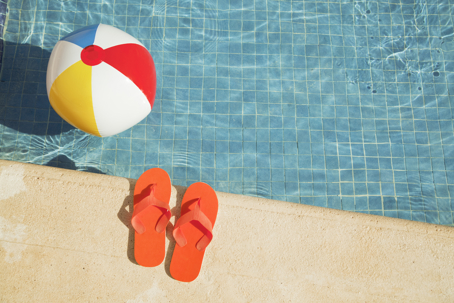A day at the pool is supposed to be all about fun, relaxation, and making waves—not unexpected injuries caused by faulty pool toys or inflatables. Unfortunately, these seemingly harmless products can pose significant risks when poorly designed, manufactured, or maintained. A ruptured inflatable or a defective pool toy can quickly turn an enjoyable day into a trip to the hospital.
If you’ve been injured due to a defective pool product, you might wonder who is responsible and what your legal options are.
Common Risks Linked to Pool Toys and Inflatable Defects
Pool toys and inflatables are staples of any poolside experience. From floating loungers to water pistols, these products can make your time in the water more entertaining. However, they aren’t always as safe as they seem. Defective products or poorly maintained items can lead to serious accidents, including:
1. Sudden Deflation or Structural Failures
Imagine floating peacefully on an inflatable raft that suddenly deflates, dropping you into deep water. If you’re unable to swim or the water’s depth isn’t suitable, this could result in drowning risks. Structural failures often occur when inflatables are made with low-quality materials or flawed designs.
2. Choking or Entanglement Hazards
Some pool toys have small parts or flimsy attachments that can break off, posing serious choking risks, especially to children. Additionally, long strings or cords on toys might accidentally wrap around a swimmer, leading to entanglement injuries.
3. Chemical Exposure
Pool toys or equipment made with unsafe chemicals, like certain types of plastic or paint, can cause skin irritations, rashes, or worse when exposed to water or direct sunlight for prolonged periods. This is particularly concerning for children with sensitive skin.
4. Sharp Edges or Poor Design
Improperly finished edges or designs can lead to cuts, punctures, or scrapes. For instance, an inflatable with sharp seams could unexpectedly harm the user during basic handling or play.
5. Instability in the Water
Some inflatables, like large floating slides or rafts, can become dangerously unstable, tipping easily or failing to support the recommended weight safely. This can result in falls, head injuries, or even drowning.
Whether it’s due to a lack of safety testing or poor-quality production, defective pool toys can put swimmers at risk. The key question is, who should be held accountable when injuries arise?
Legal Responsibilities of Manufacturers and Property Owners
Understanding liability is crucial when injuries stem from defective pool products. Both manufacturers and property owners may bear responsibility, depending on the circumstances.
1. Manufacturer Liability
Product manufacturers are legally obligated to design and produce items that are safe for their intended use. When a defect causes harm, they could be held accountable under product liability laws, which generally include three types of defects:
Design Defects
These occur when the original design is flawed, making the product inherently dangerous, even when manufactured correctly. For example, an inflatable wave slide with a steep, unsafe angle that leads to falls could be deemed defective by design.
Manufacturing Defects
These arise during production, such as when a batch of pool toys is produced using subpar materials or improperly assembled.
Marketing Defects
Failure to provide proper safety instructions, warnings, or age-specific guidelines on packaging can also lead to liability. For instance, if a toy suitable for ages 10+ lacks warning labels and ends up injuring a toddler, the company could be found negligent.
2. Property Owner Responsibilities
If your injury occurred at someone else’s pool—whether a private homeowner’s pool, a public facility, or an Airbnb rental—the property owner might also bear some responsibility. Under premises liability laws, owners are required to maintain a safe environment for their guests, including ensuring that pool toys and inflatables are safe to use.
If they knowingly provided defective equipment or failed to properly maintain inflatables by inflating them correctly or inspecting them for defects, they could be partially responsible for any resulting injury.
Steps to Protect Your Rights After an Injury
If you or a loved one has been injured by a defective pool toy or inflatable, taking the right actions can make a significant difference in achieving a fair resolution. Here’s what you should do:
1. Seek Immediate Medical Attention
Even seemingly minor injuries, like scrapes or bruises, should be evaluated. Some injuries, like water inhalation or concussions from a fall, may not show symptoms right away. Medical records also serve as crucial evidence if you decide to pursue a claim.
2. Preserve the Evidence
If the defective product caused your injury, don’t dispose of it. Keep the item in its current condition, and store it safely. If possible, take photos of the product, its packaging, and the scene of the accident. Documenting these details can help build a strong case.
3. Report the Incident
If the accident happened on someone else’s property, notify them immediately. For injuries at an Airbnb or public facility, submit a formal report to the property manager or staff. If a specific product was at fault, contacting the manufacturer or retailer may also be necessary.
4. Consult an Experienced Attorney
Navigating product liability or premises liability claims can be complex, especially when multiple parties (like manufacturers and property owners) are involved. A skilled personal injury attorney can help you determine who is liable, assess potential compensation, and protect your rights throughout the legal process.
5. Avoid Quick Settlements
If a property owner or manufacturer’s insurance company offers you a settlement, don’t accept it without consulting your attorney. Initial offers are often much lower than what you may be entitled to. Your lawyer can negotiate on your behalf to ensure fair compensation.
6. Be Wary of Social Media
Avoid discussing your injury, sharing photos, or posting about your experience online. Any statements made publicly could potentially be used against your claim later.
Potential Compensation for Your Injuries
If negligence or a defect is proven, you may be entitled to compensation, which could cover:
- Medical bills (emergency care, ongoing treatment, or rehabilitation)
- Lost wages if your injury prevents you from working
- Pain and suffering caused by the trauma or anxiety
- Long-term disability or diminished earning capacity
- Additional costs, such as travel expenses for doctor appointments
Receiving fair compensation can alleviate some of the financial burdens that come with an unforeseen accident.
Seattle Product Liability Attorneys
As concerns surrounding pool toy safety continue to evolve, ensuring you make informed decisions is critical for a secure aquatic experience. If you have concerns about a past injury or seek advice on safe usage practices, Carpenter & Zuckerman’s experienced team in Seattle is here to assist. Our dedicated personal injury attorneys are well-versed in handling product liability cases and are committed to providing the legal support you need. Contact us today at (425) 585-4009 to explore how we can help you safeguard your family's well-being and bring accountability to those responsible for defective products.

